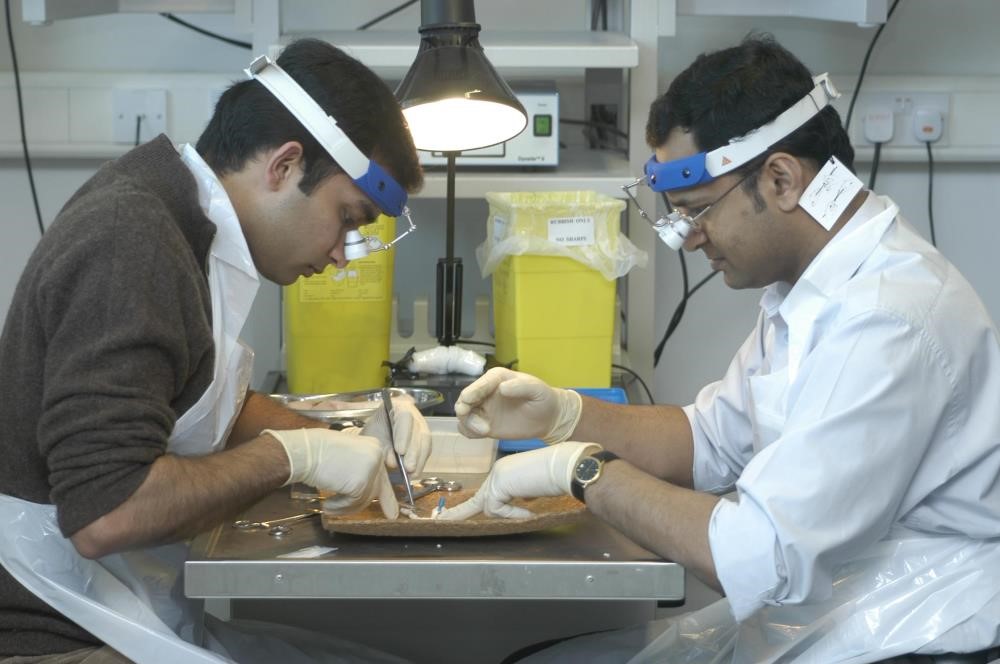Centre Accreditation
Providing a quality mark for surgical education

A growing number of hospitals, medical organisations and medical equipment companies are providing a range of education courses for surgeons, face-to-face and online.
Often these courses are run at the provider's own centre, or the courses are developed by the provider and run at various locations in the UK and overseas. In addition, training providers offer stand-alone online learning courses, or a blend of distance and face-to-face learning.
The Royal College of Surgeons of England is keen to ensure and enhance the quality of courses offered by centres through its centre accreditation process.
Benefits of Centre Accreditation
The process involves a review of an entire surgical education centre. This includes assessment of:
- facilities
- resources and faculty
- the education portfolio
- the infrastructure and quality management processes which underpin the delivery of the centre's educational products
RCS centre accreditation is only awarded where there is a clear demonstration of, and a broad confidence in, the quality of each of these components.
Accreditation gives the centre degree of autonomy in amending its course portfolio and introducing new courses during the accreditation period, subject to RCS approval.
Benefits of Centre Accreditation
The benefits of centre accreditation include:
- Expert review of the centre and all surgery-related course provision
- Use of the strap line ‘Accredited by the Royal College of Surgeons of England’ for a three year accreditation term (subject to satisfactory monitoring and review)
- Use of the RCS Logo on materials and websites related to the centre
- Use of the RCS Logo on materials and websites for each surgical course run by the centre
- Peer review of all surgical courses from a panel of leading surgeons
- Listing on RCS Website
- Listing on RCS Accreditation Portal
- Listing in RCS Bulletin
- Use of RCS participant evaluation materials
- Applicable courses will be awarded with Continuing Professional Development (CPD) points as part of course accreditation (where relevant)
RCS Accreditation cycle
The table below outlines the type of information that would be required as part of a Centre Accreditation Application. The Centre Approval Application should be supported by relevantappendices, including existing policy statements and data, as well as any additional information that may support the application.
| Criteria | Information required |
|---|---|
| Appropriate Learning Environment | Brief description of the Centre (incl. evidence of a shared educational philosophy with College) |
| Range of programmes | |
| Strategy for delivery of surgical courses | |
| A rationale for the proposed collaboration, both in terms of the programme and in working with College within the context of the Centre strategy | |
| Clear statement that the Centre understands and agrees to operate the principles and practices established for the collaboration | |
| Details of the resource base to support programmes – physical accommodation, revenue, capital support, computing facilities, subject specific resources | |
| Staff details | |
| Arrangements for educational and administrative support of participants | |
| Effective Organisational Structure | Description of the Centre’s organisational structures |
| Learning and teaching strategy | |
| How responsibility for programme design, delivery and assessment is devolved locally | |
| Quality Assurance of the Centre’s provision | The procedures for maintenance and enhancement of quality and standards |
| How the Centre monitors and evaluates its overall performance | |
| How programme quality is monitored and evaluated within the Centre | |
| How the Centre will prepare monitoring and review reports | |
| How the reports will be considered within the Centre, and the process for implementing recommended actions | |
| How participant evaluation of programmes occurs | |
| Decision making and problem resolution systems at programme and Centre level | |
| Educational Portfolio | Number of Courses/ Specialties(Subspecialties) |
| Course Programme Details (as per Course Approval requirements pro-forma) |
How to apply
In order to apply for surgical education centre accreditation, a centre will need to demonstrate that it has the academic and administrative infrastructure required for surgical education provision.
If you have any queries about Surgical Education Centre Accreditation, please contact the Quality Assurance Department at qa@rcseng.ac.uk or on 020 7869 6221/6236.

